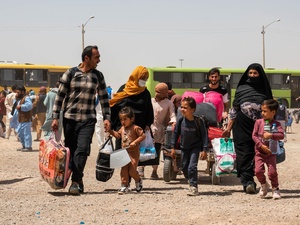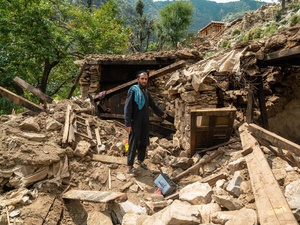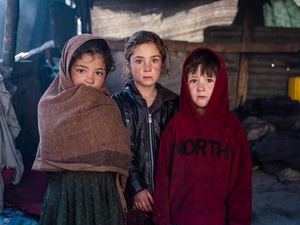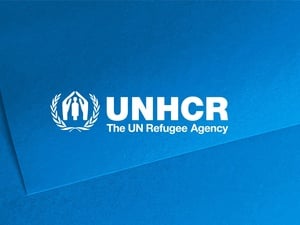Afghanistan Humanitarian Update No. 56
Afghanistan Humanitarian Update No. 56
5 March 2002
At a Glance:
- Displaced Afghans to return to Shomali Plain
- Fresh aid goes to Kandahar Province as exodus eases
- More Afghans repatriate with UNHCR aid
Displaced Afghans to return to Shomali Plain
On Wednesday, UNHCR and the Afghan Ministry of Repatriation will begin helping more than 15,000 internally displaced Afghans in Kabul to return to their homes in the Shomali region of central Afghanistan.
The Afghans fled their homes nearly three years ago and have been squatting in filthy conditions at the old Soviet compound in Kabul. Their villages and farms on the frontline of the Afghan civil war were pillaged and destroyed by the Taliban and much of the once fertile and prosperous Shomali plain was reduced to a barren wasteland.
UNHCR plans to shift 150 families - some 750 persons - on Wednesday from the old Soviet compound to their home villages in Qara Bagh district.
The UN refugee agency is co-ordinating the two-week-long return exercise and providing an aid package consisting of tents, plastic sheets, blankets, buckets, shawls, soap, clothing and charcoal. The UN World Food Programme will distribute 150 kilogrammes of wheat to each family. The International Organization for Migration will transport them to their villages. CARE, ACTED and the Japanese NGO, JEN are also offering assistance to the returnees.
To help the IDPs pick up the pieces and rebuild their homes, UNHCR will also provide a standard package of shelter materials to each family. The package will consist of beams, doors, windows, door- and window-frames, as well as hammers, axes, nails and door hinges. In addition, the returnees will receive a seed and implements kit to help them cultivate the land and once again start growing crops.
UNHCR, in collaboration with CARE and Save the Children (US), carried out a survey to determine the number of families in the old Soviet Compound in Kabul in December 2001. The overwhelming majority of the occupants expressed the desire to return home at the end of the winter.
This is the second UNHCR-assisted return to the Shomali Plain. Between December 2001 and January 2002, the UN refugee agency and its partners helped move more than 8,000 Afghans from the Panjshir valley in Kapisa province, while another 8,000 are known to have spontaneously returned.
The combined effects of hunger, drought and conflict have displaced over 1.2 million Afghans, some 200,000 of whom originate from the Shomali plain. During 2002, UNHCR plans to assist help some 400,000 internally displaced Afghans to return to their villages of origin.
Fresh aid goes to Kandahar Province as exodus eases
In an effort to boost the available of relief aid inside Afghanistan, UNHCR sent a 16-truck convoy into southern Afghanistan's Kandahar Province on Monday. The convoy carried 4,900 tents, 10,000 buckets, 3,100 jerry cans and 2,700 sleeping mats.
The agency plans to distribute the goods to desperate people in southern Afghanistan in an effort to avert further movements towards Pakistan and to help people sheltered in several displaced person camps near Spin Boldak, located south-east of Kandahar on the frontier with Pakistan. Monday's UNHCR convoy follows a similar delivery last week of 29 trucks.
Meanwhile, sources at Chaman just inside the Pakistani border say that some 300 new families - up to 1,500 people - arrived over the weekend. They joined some 10,000 Afghans waiting on the edge of UNHCR's Killi Faizo transit camp for registration to resume so that they may be admitted to UN-assisted camps in the region.
In the last two months, UNHCR has recorded more than 45,000 fresh arrivals at the Chaman border. No one has been registered since Feb. 21.
The majority of the Afghans in the waiting area are Kuchi nomads who say they lost their animals due to the drought and have no other source of livelihood. A large number of ethnic Pashtun families from the north of the country who say they fled ethnic tension are also present at the windswept frontier site.
Aid agencies operating in Chaman are sending international staff back to the border town on Wednesday after a five day absence following a security incident last Thursday when staff of Mercy Corps International were robbed during early morning hours by masked, armed men. UN safety specialists subsequently investigated the incident and gave the green light for agencies to again stay over in the area.
A recent UNHCR survey of the displaced person camps at Spin Boldak found more than 40,000 persons in the five makeshift sites. Mohd Rasheed site shelters 1,960 families, Al-Akhter Trust site is home to 1,535 families, Al Rashid Trust camp houses 1,180 families, the International Islamic Relief Organization camp shelters 1,150 families and the WAMIX site hosts 1,000 needy families.
More Afghans return with UNHCR aid
More than 2,600 Afghans in Pakistan returned to Afghanistan today, taking advantage of a programme the United Nations High Commissioner for Refugees launched last week to help repatriating refugees.
Tuesday's returnees comprised 494 families. They drove across the border in 186 cars and trucks loaded with beds, mattresses, furniture and other belongings accumulated through the years in Pakistan, which hosts some 2 million Afghan refugees.
UNHCR's assistance programme to Afghans opting to head home started on Friday with 200 Afghans registering at the Takhta Baig Voluntary Repatriation Centre outside the Pakistan town of Peshawar. On Monday, after a weekend break, 3,000 Afghans repatriated.
During the programme's first three days, the total was around 5,800 returnees, some coming from as far away as Karachi and Lahore.
Each returnee who registers with UNHCR receives 20 dollars, or 100 dollars per family of five, in order to cover transportation expenses on arrival at Mohmandar in Afghanistan, where UNHCR has set up a cash distribution point. At their destination, each family receives a plastic tarpaulin, a sleeping mat, blankets, a lamp, a stove and a hygienic package. The UN's World Food Programme provides them with 150 kilogrammes of wheat.
The UN refugee agency plans to open a second registration centre in Quetta by mid-March. Seven such centres are planned for Pakistan. A similar programme is expected to start next month in Iran, which cares for 1.5 million Afghan refugees.
Since a new government was installed in Kabul in December, more than 181,000 Afghan refugees have returned home from Iran and Pakistan despite devastation following decades of war, shortages of food, drought and instability in some provinces. The returnees now heading back with UNHCR help are mostly bound for Jalalabad and Kabul. They said they expected others to return if there are opportunities to earn a living.
UNHCR has strengthened its staff in Jalalabad to meet the needs of the returnees. Its partners also have resumed in the past month Quick Impact Projects, interrupted by the U.S.-led war against terrorism last autumn.
Because of the precarious security situation in some parts of Afghanistan, UNHCR is cautioning Afghans spontaneously returning with support from the new initiative to avoid certain areas. Provinces and areas on UNHCR's "caution" list include: Paktia, Khost, Paktika, Zabul, Uruzgan (south), Nimroz, Helmand, Farah, Tora Bora and Sholgara.









